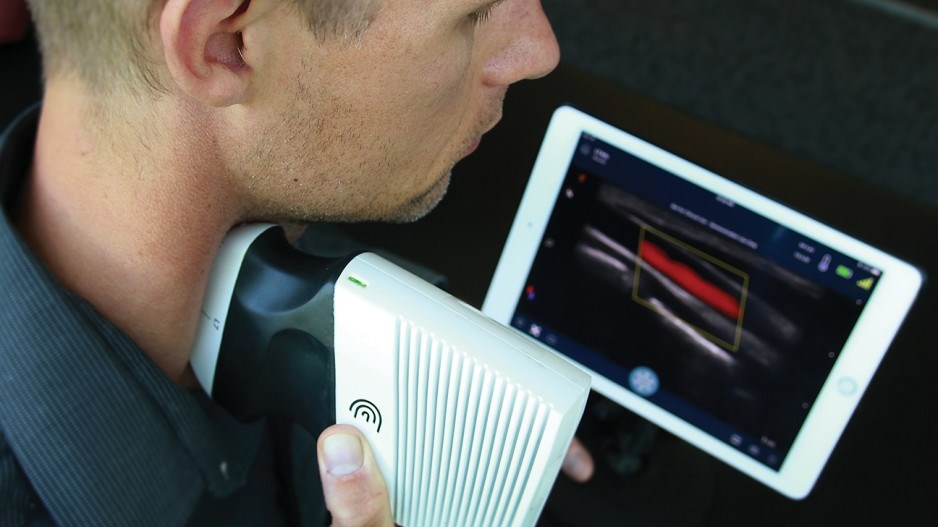Bridging the gap between Canada’s core industries and B.C.’s booming technology sector is proving to be a boon for many up-and-coming companies.
One such firm adding value to an existing industry is Vancouver-based med-tech company Clarius Mobile Health.
Founded in 2014, the privately held medical-supply company based out of Burnaby has grown from a 15-person startup in 2016 to a fully fledged business employing more than 75 staff members.
The growth came after Dave Willis, company co-founder and chief strategy officer, received clearance to develop and distribute Clarius’ unique ultrasound device.
“Our vision was making something affordable so that we could get it in the hands of every physician who needs ultrasound for guidance,” he explained.
Willis and Clarius co-founder Laurent Pelissier both come from a background in ultrasound sales and development. On a trip overseas with a previous employer, Willis realized the need for a product to revolutionize current industry dilemmas.
“I was in a large anesthesia department in Australia when one of the physicians leaned over and said, ‘We have 32 doctors in this department and two ultrasound machines,’” he said.
Clarius’ app-based, wireless, hand-held ultrasound systems are compatible with mobile devices like smartphones and tablets and are designed to conduct quick scans and bedside procedures as an easy alternative for overloaded clinicians with limited access to equipment.
“Having something that is so easy to deploy and use has tremendous advantages,” said Tim Salcudean, biomedical engineering professor at the University of British Columbia. “The machine [Clarius] has developed is of very high quality; we have one in the lab.”
The Clarius C3 can perform ultrasound scans of the abdomen, lungs and heart while the Clarius L7 is a procedural guidance and superficial imaging scanner.
In April of this year, the budding technology company was awarded the Growth Stage Medtech Company of the Year Award by LifeSciences BC, and, a month prior, it received the Business Excellence Award for Innovation from the Burnaby Board of Trade and the City of Burnaby.
Salcudean is quick to praise the obvious benefits of this innovative med-tech device, given the common equipment dilemma in his day-to-day life.
“There are, clearly, many applications that can be done in the gastroenterologist office or neurologist office and even family doctor’s office just by having access to software like Clarius, that makes this [technology] easy to use and of great benefit,” he said.
The rapid expansion and success of the company, according to Willis, is a result not just of a great product but also Clarius’ setting in B.C.’s widening tech circle.
“B.C. has a very high talent pool as far as engineering goes. A big portion of our staff is engineering, and they have come up with some truly innovative designs in what we are doing,” he said.
According to a recent report from Deloitte, B.C.’s tech sector employs more than 150,000 people and generates $26 billion annually, making it the fastest-growing tech workforce and fastest-growing tech sector in Canada.
While the fact that technology is bustling in B.C. is not new, the medical health-technology sector is just another avenue of the industry that is picking up steam as industry needs are explored.
“The market prediction is that point-of-care applications of ultrasound, especially mobile ultrasound, will undergo tremendous growth,” said Salcudean.
As technology becomes more sophisticated and the creative ideas keep flowing in, investment interest builds.
“With all the health-related stuff happening here, you see a lot of good ideas coming out and they really need mentorship and money to get them to the viable businesses,” said Paul Geyer, newly appointed CEO of Vancouver-based investment firm Discovery Parks.
Geyer easily recalls the time when his company’s main mission was finding real estate for tech companies – a strategy he has had to rethink.
“Thirty-five years ago it was really hard for tech companies to get space because no one wanted to rent to them because they didn’t have cash flow,” he said.
“Now, not so much. [There are] lots of tech companies locally, lots of space providers. The [Discovery Parks] board took a long hard look at how we could move the needle and decided that health tech was the primary area to invest in.”
Discovery Parks continues to support the health-tech community with the Generator – a 5,000-square-foot incubator space for high-tech startups. New companies can compete to win 12 months of free workspace in an initiative that was developed together with the City of Vancouver in 2011.
Additionally, Discovery Parks plans to deploy $20 million into “somewhere between eight and 12 different investments in the health-tech field.”
The advancement of the med-tech field is something that Bill Tam, president and CEO of the BC Tech Association, sees as the natural evolution of pairing the new with the old.
“We want to stitch together some of the core industries that we already have with the technology players in B.C. and apply digital technology to things like the natural resources industry, the health-care industry, the transportation industry,” said Tam.
“That could create the case for collaboration across the country, which is a very strong opportunity for us.” •
Tam and the BC Tech Association have been campaigning for increased cash infusion from the Canadian government on the basis that B.C. is the country’s leading technology hub.
“It’s interesting that we are about to celebrate Canada’s 150th [birthday] when, back in the day, the nation’s exercise was about building the Canadian Pacific Railway from east to west,” said Tam.
“Digital transformation and the opportunity for [B.C.] to lead from west to east lies in the design of how industries in Canada can make use of technology.”




